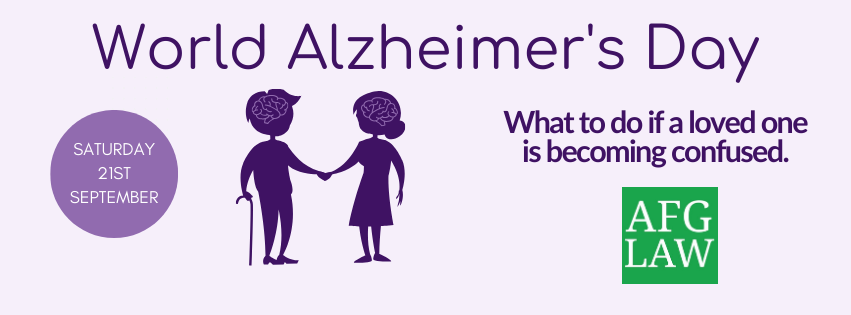Have you started to notice subtle changes in a relative recently? Are they starting to become a little confused, forgetful, or anxious? Particularly in older people, it can be very easy to brush it off and say “It’s just their age”.
However, if you suspect that your loved one may be suffering from Alzheimer’s Disease, it is in everyone’s best interest to act promptly.
Alzheimer’s Disease is a brain disorder that gets progressively worse over time, with side effects ranging from memory loss to a decline in simple social skills.
According to Alzheimer’s Association, about 1 in 9 people aged 65 and older has Alzheimer’s. That is quite an alarming statistic – and if a family member has become forgetful, you may be wondering which way to turn.
Hamza Mustafa, Head of Private Client at AFG LAW offers his top tips on the best way to support your loved one at what can be an extremely worrying time.
Keep an eye on changes in behaviour.
The onset of Alzheimer’s can be very subtle, however the initial tell tale signs may include:
- Memory loss that is more than being occasionally forgetful disrupts daily life
- Poor judgment which can lead to bad decisions
- Loss of spontaneity, initiative and confidence
- Losing track of dates or knowing current location
- Taking longer to complete normal daily tasks
- Repeating questions or forgetting information
- Challenges in planning or solving problems
- Wandering off and getting lost
- Losing things or misplacing them in unusual places
- Mood and personality changes
- Increased anxiety and/or aggression
Talk to your relative
It is often a good idea to start the communication early on – and include your loved one. Explain to them what may be happening and what you are planning to do to support them. This is often a very scary time, and it will be a huge comfort for them to know that they don’t have to face any possible diagnosis on their own. Talking can also help them to get the support they need and quickly. Ensure that you prepare for the conversation in advance, choosing a time when they feel relaxed, have privacy and quiet, listen to what they have to say – and above all, try to remain positive.
Go to the GP with your relative
Visiting your relative’s GP with them should be done as soon as possible. A Doctor will ask specific questions and may conduct tests and procedures to establish what could be causing the symptoms and to refer your relative to a specialist
If your relative is reluctant to visit the GP, you could mention your concerns to the GP yourself. Patient confidentiality means they not able to give out information about a patient, but they are able to receive information and also sign post and offer advice
Take a practical approach
Look after the practical side of things. If your relative has Alzheimer’s Disease, you may be required to act on their behalf – and obtaining a Lasting Power of Attorney can be very helpful.
Get in Touch
As a leading law firm which specialises in Private Client Matters, AFG Law, with offices in Bolton, Bury and Stockport, have helped many families with the practical steps that can be put in place to support a family member with the condition.
AFG LAW’s lasting power of attorney solicitors can help you decide not only who to appoint as your attorney, but also whether a replacement attorney is necessary and whether multiple attorneys should be appointed jointly or jointly and severally. For more information on how we can help support you and your family at this difficult time, please get in touch via email on info@afglaw.co.uk or telephone on 01204 920106.
